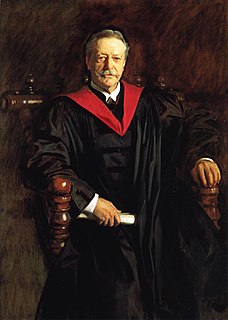A Quote by Abbott Lawrence Lowell
Pleasure is a by-product of doing something that is worth doing. Therefore, do not seek pleasure as such. Pleasure comes of seeking something else, and comes by the way.
Related Quotes
Lenten practices of giving up pleasures are good reminders that the purpose of life is not pleasure. The purpose of life is to attain to perfect life, all truth and undying ecstatic love - which is the definition of God. In pursuing that goal we find happiness. Pleasure is not the purpose of anything; pleasure is a by-product resulting from doing something that is good. One of the best ways to get happiness and pleasure out of life is to ask ourselves, 'How can I please God?' and, 'Why am I not better?' It is the pleasure-seeker who is bored, for all pleasures diminish with repetition.
I'm not the "not-working" type. I derive pleasure from my work. Work gives me relaxation too. Every moment I am thinking of something new: making a new plan, new ways to work. In the same way that a scientist draws pleasure from long hours in the laboratory, I draw pleasure in governance, in doing new things and bringing people together. That pleasure is sufficient for me.
Perhaps everything lies in knowing what words to speak, what actions to perform, and in what order and rhythm; or else someone's gaze, answer, gesture is enough; it is enough for someone to do something for the sheer pleasure of doing it, and for his pleasure to become the pleasure of others: at that moment, all spaces change, all heights, distances; the city is transfigured, becomes crystalline, transparent as a dragonfly.
At the heart of our desires is eternal happiness without the slightest hint of misery. You could say that we are pleasure seekers; however, seeking pleasure from the objects of our five senses produces fleeting moments of pleasure whereas, pleasure of one's self, a soul, is eternal and ever-increasing pleasure.
We know there are certain chemicals that are designed to give us a rush of pleasure. But, one of the most amazing things about being human is our capacity to override that pleasure. To either say, 'I don't need that pleasure right now. I'm going to ignore the craving.' Or to find something else that we find a deeper sense of reward from.
In architecture, to do anything beyond object form is often treated as something extra-disciplinary - something outside the discipline that has nothing to do with art. So I'm making it clear that this is an artistic choice. It's not everyone's artistic choice. Some people should choose only to make object form because that's what gives them pleasure. But there are people for whom aesthetic pleasure comes from doing something else, and why would you deny that choice? It's another autonomous choice.
When you're comfortable and secure, it's not enough. The mind doesn't stop there because it has to continue to focus itself as this body, so it moves to pleasure. And pleasure really is a non-existent thing. When we're experiencing pleasure, we're trying to hold onto it as it leaves, so it really isn't pleasure. Pleasure is pain because we're grasping.
There is a creative pleasure, which, for instance, the artisan in the Middle Ages, or in a country like Mexico, still today has - namely the pleasure of creating something. You find quite a few skilled workers who still have that pleasure: maybe in a steel mill; maybe a worker who works with a complicated machine - he has a sense that he is creating something.































